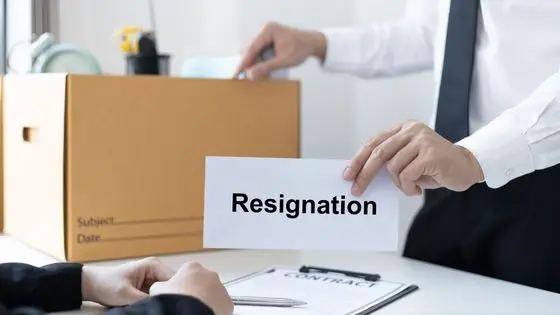Are you ready to move on to the next chapter of your life but unsure how to let your employer know you’re resigning? Writing a letter of resignation can be a daunting task, but it’s an essential step in leaving your current job on good terms.
In this article, we’ll guide you through the process of writing a professional resignation letter that will help maintain your professional relationships and leave a positive impression.
 Maintain your professional relationships and expand your network; quitting a job doesn’t have to be painful.
Maintain your professional relationships and expand your network; quitting a job doesn’t have to be painful.
Understanding Resignation Etiquette
Before you start writing your resignation letter, it’s crucial to understand the basics of resignation etiquette.
Your resignation letter should be polite, concise, and professional.
Remember, you never know when you’ll need a reference from your current employer, so it’s essential to leave on good terms.
Here are some essential points to keep in mind while writing your resignation letter:
Giving Your Employer Proper Notice
Providing your employer with appropriate notice is a crucial aspect of resignation etiquette.
Typically, two weeks’ notice is standard practice, but you should consult your contract to see if any specific requirements apply. Be sure to give your employer sufficient time to find a replacement for your position.
Being Positive in Tone
When writing your resignation letter, it’s essential to maintain a positive tone. Thank your employer for the opportunities you received during your time there, and express your gratitude for the experience gained. Avoid discussing negative aspects of your job or employer, as it may harm your professional relationships.
Staying Professional Despite Circumstances
Your resignation letter is a formal document that should remain professional in tone and content. Avoid using slang, contractions, or overly casual language. Ensure that your letter is free of typos and grammatical errors.
 Write that letter of resignation and leave your current employer with a positive impression of you.
Write that letter of resignation and leave your current employer with a positive impression of you.
How to Write a Letter of Resignation
Now that you understand the basics of resignation etiquette, let’s dive into the steps for writing a professional resignation letter.
Step 1: Start with a Salutation
Begin your letter with a formal salutation, such as “Dear [Manager’s Name].” Ensure that you address your letter to the appropriate person.
Step 2: State Your Intentions
In the opening paragraph, state your intentions to resign from your position. Keep it simple and straightforward, and avoid giving too much detail.
Step 3: Express Gratitude
In the second paragraph, express your gratitude for the opportunities you received during your time there. Be specific about what you learned and how it helped you grow professionally.
Step 4: Provide Notice
In the third paragraph, provide your employer with the appropriate notice period, which is typically two weeks. If you’re leaving due to unforeseen circumstances, explain your situation and offer to help with the transition.
Step 5: Offer Assistance
In the fourth paragraph, offer to help with the transition process, such as training your replacement or creating documentation to help the new hire get up to speed.
Step 6: Close the Letter
In the final paragraph, reiterate your appreciation for the opportunities you received and express your willingness to help with the transition process. Sign off your letter with a formal closing, such as “Sincerely” or “Best regards.”
Example Template of a Professional Resignation Letter
Here’s an example of a letter of resignation based on the above guidelines:
[Your Name]
[Your Address]
[City, State ZIP Code]
[Your Email]
[Date]
[Manager's Name]
[Company Name]
[Address]
[City, State ZIP Code]
Dear [Manager's Name],
I am writing to formally submit my resignation from my position as [Your Position] at [Company Name]. My last day of work will be [Last Day of Work], which provides [Notice Period] weeks' notice as required by my contract.
I want to express my gratitude for the opportunities and experiences I have had during my time at [Company Name]. Working here has allowed me to develop my skills and gain valuable experience in the field, and I am grateful for the support and guidance I have received from you and the team.
I am committed to making this transition as smooth as possible for the team and the company. Please let me know how I can best help during this period, such as training a replacement, completing projects, or providing documentation for the next person in this role.
Thank you for the support and opportunities that [Company Name] has provided me. I will cherish the relationships and skills that I have gained during my time here, and I wish the company continued success in the future.
Sincerely,
[Your Name]
Tips for Writing a Professional Resignation Letter
Here are some additional tips to keep in mind while writing your resignation letter:
Keep It Short and Simple
Your resignation letter should be no more than one page long. Keep it simple and to the point, focusing on the essential information.
Be Honest
If you’re leaving because of negative circumstances, such as a difficult work environment, be honest but remain professional. Avoid personal attacks or negativity, and focus on your reasons for leaving.
Offer a Solution
If you’re leaving because of issues that can be resolved, such as workload or communication problems, offer a solution to help improve the situation before you leave. This can help maintain a positive relationship with your employer and may even lead to a change that benefits future employees.
Keep a Copy
Make sure to keep a copy of your resignation letter for your records. This can be helpful if you need to reference it in the future or if there are any disputes about the terms of your departure.
Avoid Burning Bridges
Remember that your resignation letter is a formal document that will become part of your employment record. Avoid using it as an opportunity to vent your frustrations or burn bridges with your employer. Keep it professional, polite, and positive.
FAQs
- Is it necessary to write a letter of resignation? Yes, it’s essential to provide your employer with a written notice of your resignation. This helps maintain a positive professional relationship and ensures that there are no misunderstandings about the terms of your departure.
- How much notice should I give when resigning? Typically, two weeks’ notice is standard practice. However, you should consult your contract to see if there are any specific requirements.
- What should I include in my resignation letter? Your resignation letter should include a statement of your intentions to resign, a brief expression of gratitude, your notice period, and an offer to help with the transition process.
- Can I resign via email or text message? While it’s possible to resign via email or text message, it’s not recommended. A written letter is a more professional and formal way of resigning and ensures that there are no misunderstandings about the terms of your departure.
- Should I discuss my reasons for leaving in my resignation letter? You can discuss your reasons for leaving if you choose to, but it’s not necessary. If you do decide to explain your reasons, keep it professional and avoid negativity or personal attacks.
Related:
Recommendation Letters: How to Write, Request, Turn Down, Examples
Workplace Apology Letter Examples [to a Boss, Co-Worker; Customer Service]



